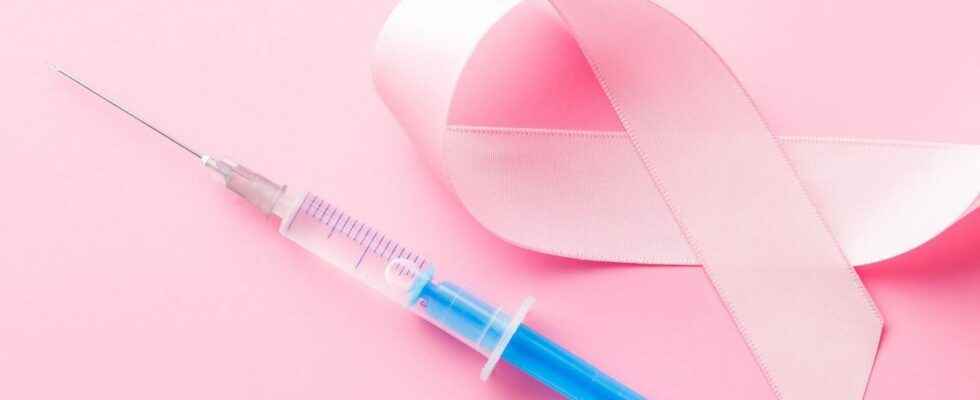Published on
Updated
Reading 3 mins.
Still in the experimental stage, a vaccine against breast cancer is currently being developed by researchers at the University of Washington School of Medicine in Seattle. The latter have just completed its phase I trial. What future can we imagine for this vaccine candidate? The answers of Dr Ivan Pourmir, oncologist and immunotherapy researcher at the Georges-Pompidou European Hospital.
A vaccine designed to target the HER2 proteins – also called human epidermal growth factor receptor 2 – and generate an immune response: this is what has just been developed by American researchers. Phase I of his study has just been completed. The authors’ findings are published in the journal JAMA Oncology.
A vaccine against a protein
In our body, the HER2 receptor is present on the surface of many cells. In the case of so-called “HER2-positive” cancers, ie 30% of breast cancers, it is overexpressed up to a hundred times more than on the surface of a normal cell. These cancers also have the particularity of being more aggressive and likely to recur after treatment.
The presence in large quantities of this HER2 receptor also develops in these patients a type of immune response called “cytotoxic immunity” – or cell destroyer. It is these women who are also less likely to have their cancer come back after treatment and have longer overall survival than those who do not mount such an immune response.
Based on this observation, the authors of this work have developed a candidate DNA vaccine. Unlike protein vaccines, which typically contain a protein or part of a protein for the immune system to target, DNA vaccines contain the DNA instructions for the target protein.
A cohort of around sixty women
The scientists then recruited 66 women with metastatic cancer to participate in the phase I study. All had followed standard treatment and had either achieved complete remission or had only a bone metastasis. .
Study participants were divided into three groups, with each participant receiving three injections. One group received three injections of a low dose (10 mg) of the vaccine, one group received three injections with an intermediate dose of 100 mg and one group three injections of a high dose, up to 500 mg. The groups also received the immunostimulating drug granulocyte-macrophage colony-stimulating factor (GM-CSF), which promotes cytotoxic immunity.
Once injected, this DNA is taken up by the cells at the injection site, which then begin to produce the protein encoded in the vaccine’s DNA instructions (part of the normally intracellular HER2 protein). The cells will then present this protein to the immune system, which will make it possible to generate a stronger cytotoxic immune response. Exactly the type of immune response explained above, which allows some women not to see the disease reappear.
Participants were then followed for three to thirteen years, with a median follow-up of nearly 10 years. The researchers wanted to make sure that the vaccination would not, over time, trigger an autoimmune response against other healthy tissues carrying HER2.
Encouraging results
“Because this was not a randomized clinical trial, the results should be considered preliminary, but the results are promising enough for the vaccine to now be evaluated in a larger randomized clinical trial” says lead author Dr. Mary L. Disis, professor of medicine at the University of Washington, division of medical oncology and director of the Cancer Vaccine Institute.
“The results showed that the vaccine was very safe. In fact, the most common side effects we saw in about half of the patients were very similar to what you see with COVID vaccines: redness and swelling at the site of the injection. injection and possibly fever, chills and flu-like symptoms.”
The opinion of Dr Ivan Pourmir, medical oncologist and researcher in immunotherapy
“In my opinion, it is far too early to comment on this vaccine under development. Indeed, this publication is that of phase I, which simply makes it possible to ensure that the product does not have such toxicity that it would rule out any further development.Furthermore, I note two things: the first concerns one of the participants who declared autoimmune colitis two years after the injection, severe enough to require endoscopy and biopsies. second concerns DNA, which was detected at the injection site, up to 60 weeks later. A persistence of DNA which has an unfavorable effect on immunity. Let’s not forget that this is a complementary therapy, aimed at women, some of whom will already be cured of their cancer. For me, it is therefore premature to say that their vaccine candidate has sufficient safety in the short and long term. This requires the results of a phase 3 study, yet to come.”
